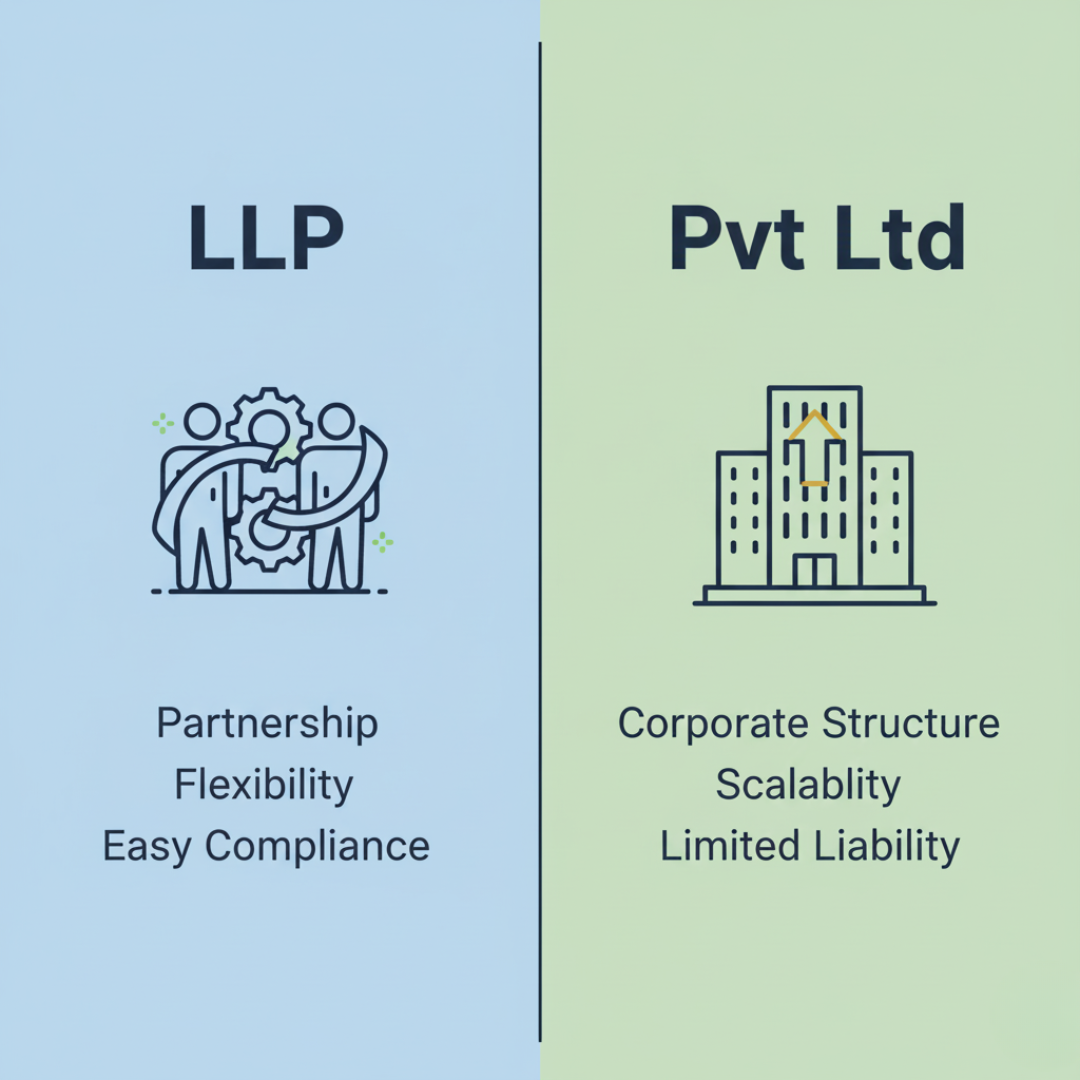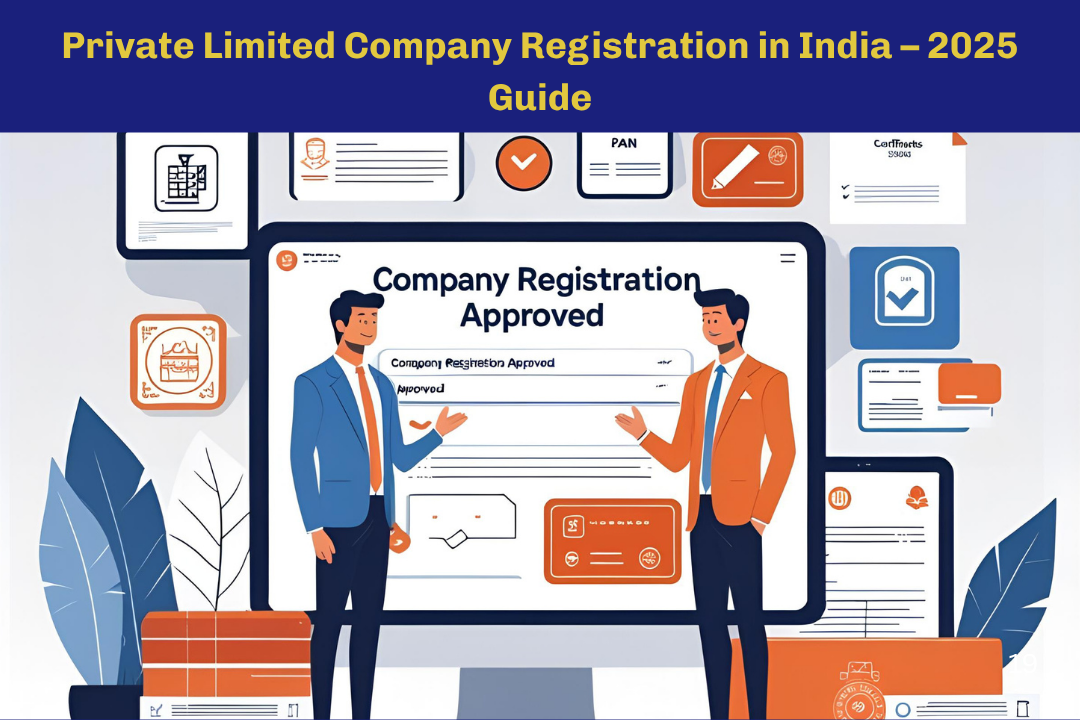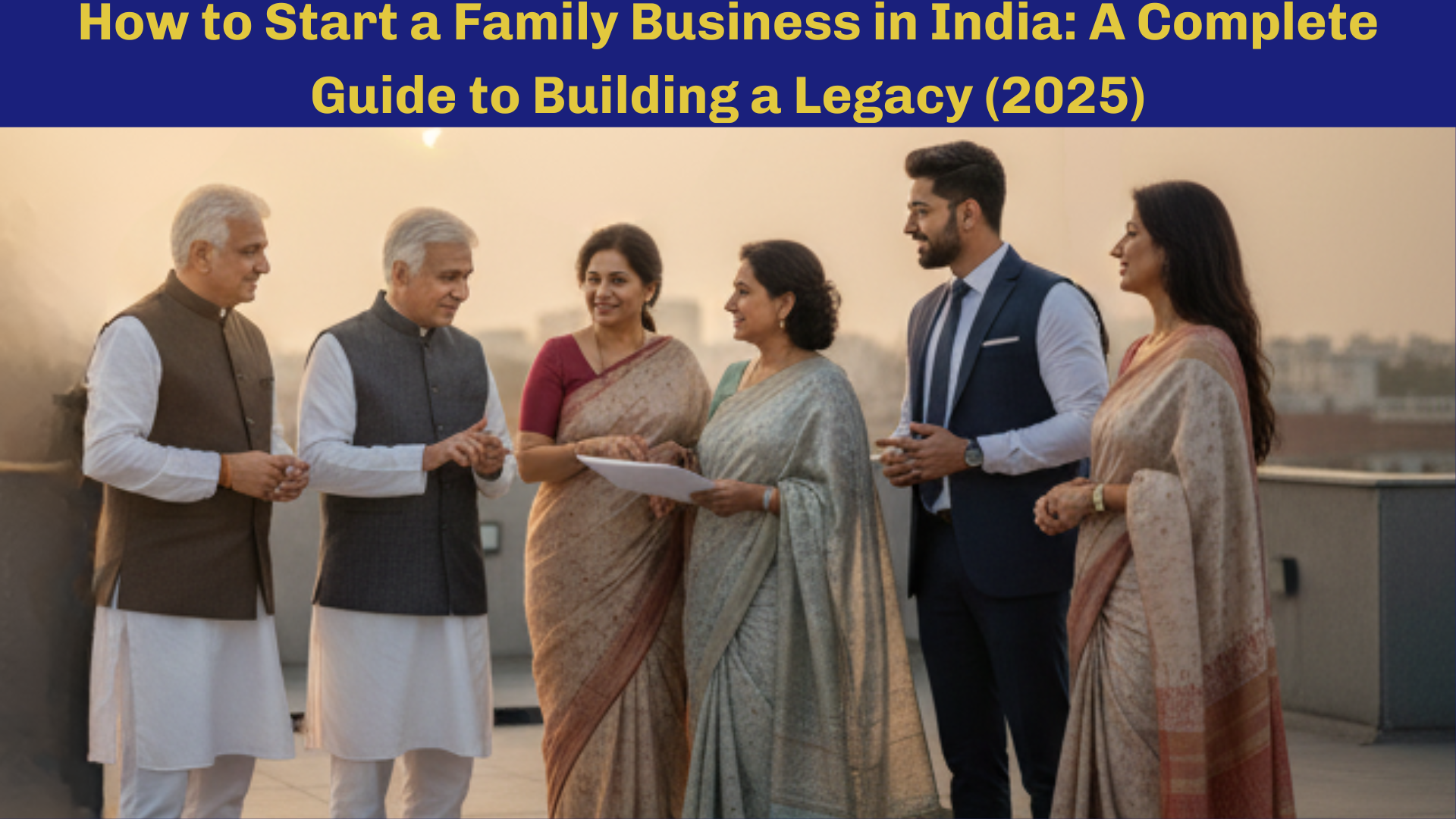Start a Family Business in India | Step-by-Step Guide (2025)
By Filing Buddy . 10 Oct 25
How to Start a Family Business in India: A Complete Guide to Building a Legacy (2025)
Let's talk about the real engine of the Indian economy. It’s not just the glittering towers of MNCs or the venture-backed startups you read about. The true, thrumming heartbeat of our economy lies much closer to home. According to a 2023 report by the Confederation of Indian Industry (CII), family-owned businesses contribute a staggering 79% of India's national GDP.
That's right. The Kirana store on the corner, the regional manufacturing giant, the multi-generational jeweler collectively, they form the backbone of our nation's wealth. Starting a family business in India isn't just a career choice; it's an opportunity to build a lasting legacy.
But here’s the catch. It’s a unique venture where your board meetings might happen at the dinner table, and your biggest shareholder is also the one who reminds you to call your relatives. The core challenge, and the reason many falter, is balancing the deep-seated trust of family relationships with the cold, hard logic required for business growth.
This is where most guides fall short. They give you a checklist but not a playbook. This guide is different. We’re going to provide a clear, strategic roadmap that shows you not only how to register your business but how to structure it for success, govern it for harmony, and grow it for generations to come.
Let's get started on building your legacy.

The Foundation: Is a Family Business Right for You? (The Pros & Cons)
Starting a business with family is like handling a high-performance engine. When it's tuned correctly, it can leave the competition in the dust. But without the right structure and maintenance, it can just as easily overheat and blow up on the racetrack. Before you turn the key, it's crucial to have an honest look under the hood.
Understanding the family business pros and cons isn't just an academic exercise; it's the first and most important step in your strategic planning.
The Upside: The Unfair Advantage
Deep-Seated Trust: The foundation is built on years of shared history. This intrinsic trust can cut through red tape, speed up decisions, and create a level of loyalty that non-family businesses can only dream of.
Long-Term Vision: While competitors are chasing quarterly earnings, family businesses can afford to think in generations. You're not just selling a product; you're building a legacy. This allows for patient, sustainable growth.
Unwavering Commitment: Family members are often invested on a level that goes beyond a simple paycheck. They're more likely to weather tough times, take pay cuts, and put in the extra hours needed to ensure the family's name—and future—is secure.
Flexibility and Speed: A major decision can be made over a cup of chai instead of a three-week-long meeting process. This agility allows family businesses to react to market changes and opportunities much faster than larger, more bureaucratic corporations.
The Downside: The Hidden Traps
Emotional Baggage & Conflict: The very history that builds trust can also be a liability. Yesterday’s argument over a trivial matter can become tomorrow’s boardroom deadlock. Business decisions can become intensely personal.
The Nepotism Trap: One of the greatest challenges of a family business is the pressure to hire relatives, regardless of their skills. Promoting a cousin who can barely manage a grocery list to a key management position is the fastest way to demotivate skilled, non-family employees.
Lack of Structure: The informal "kitchen table" decision-making that feels so efficient at the start can quickly lead to chaos. Without clear roles and documented processes, accountability vanishes and confusion reigns.
The Succession Nightmare: Here’s a chilling statistic: only about 12% of family businesses survive to the third generation. Without a clear, merit-based plan for who takes over, the business is at high risk of failing the moment the founder steps away.
Seeing these risks of starting a family business laid out isn't a reason to abandon your dream. It’s a reason to prepare.
The most successful family businesses aren't the ones without problems; they're the ones who anticipated them and built a framework to manage them. And that framework starts not with lawyers or paperwork, but with a series of crucial, honest conversations.

The Blueprint: The 4 Crucial Conversations Before You Launch
Most people starting a business rush to a consultant to talk about legal structures and tax implications. But the strongest family businesses are built long before that—not with legal documents, but with honest, difficult, and structured conversations.
Think of this as creating the psychological and strategic foundation of your business. These conversations will form your informal family business agreement, a set of guiding principles that will prevent 90% of future conflicts. Don't skip this step.
Vision: The "Why" Behind the Wallet
Before you discuss a single rupee, you need to align on your destination. This isn't just about making money; it's about defining your purpose. Get everyone in a room and answer these questions with brutal honesty:
What is our ultimate purpose? Are we building a cash cow to fund our lifestyles, a market leader to dominate an industry, or a legacy to last 100 years?
What does success look like in 10 years? Be specific. Is it a certain revenue number, opening in five cities, or becoming the most respected brand in your niche?
What are our non-negotiable values? Will we prioritize quality over cost, employee welfare over executive bonuses, etc.?
You wouldn't start building a house without a blueprint; this is the blueprint for your family's legacy.
Roles & Responsibilities: The Merit Over Bloodline Rule
This is where many family ventures stumble. To succeed, you must operate as a business, not just a family. That means assigning roles in family business based on merit, not birth order or sentiment.
Assign roles based on skill: Just because someone is the eldest doesn't automatically make them the CEO. Who is genuinely the best at sales? Who is meticulous with finances? Put the right person in the right seat.
Create actual job descriptions: Clearly define the responsibilities and key performance indicators (KPIs) for each role. This removes ambiguity and makes everyone accountable for their results, not just their last name.
Compensation: The "Fair vs. Equal" Talk
This conversation can be more awkward than a family dinner after a cricket loss, but it's a hundred times more important. You must distinguish between "fair" and "equal."
Fair is not Equal: Salaries should not be split equally like pocket money. A fair salary is based on the person's role, responsibilities, and the market rate for that position. Your brother, the Head of Marketing, should be compensated based on industry standards for that role, not simply because he's your brother.
Define Profit Distribution: How will profits be handled? Decide on a clear policy: how much gets reinvested back into the business for growth, and how much gets distributed to the owners/shareholders as dividends?
Entry & Exit: The "Pre-nup" for Your Business
It might sound cynical, but planning for departures is one of the smartest things you can do. These family business rules protect everyone involved.
The Entry Clause: What are the rules for the next generation or a new spouse joining the business? Must they have a specific degree? Is there a requirement to work elsewhere for a few years to gain outside experience? (A common rule in highly successful family conglomerates).
The Exit Clause: What happens if someone wants to leave? How will their share be valued and bought out? More importantly, what is the process if a family member is underperforming and needs to be let go?
Having these uncomfortable conversations now, while everyone is excited and aligned, is the key that turns unspoken assumptions into a powerful, unified family business agreement.

Choosing Your Legal Armor: The Right Business Structure
After building your foundation on trust and conversation, it’s time to build the fortress. The right legal business structure in India is your armor—it’s the legal shield that separates business liabilities from your personal wealth, ensuring a business problem doesn't become a family crisis.
Why a Traditional Partnership is a Risky Bet
Many families default to a traditional Partnership Firm because it seems simple. However, this simplicity comes at a dangerously high price: unlimited liability. In a Partnership, if the business incurs debt, creditors can legally come after your personal car, your house, and your savings.1 It’s a level of risk that no modern family should have to take.
The Modern Champions: LLP vs. Private Limited Company
For a modern family business, the choice almost always boils down to two excellent options. Think of it as choosing between Flexibility (LLP) and Ambition (Pvt Ltd).
| Feature | Limited Liability Partnership (LLP) | Private Limited Company (Pvt Ltd) |
| Personal Liability | Limited: Your personal assets are protected. Liability is limited to your capital contribution. | Limited: Your personal assets are fully protected. This is the core benefit. |
| Compliance Burden | Lower: Fewer mandatory meetings and simpler annual filings (if below certain thresholds). | Higher: Requires board meetings, shareholder meetings, statutory audits, and more detailed ROC filings. |
| Best For... | Service-based businesses, real estate ventures, and families seeking operational flexibility with less red tape. | Businesses planning to raise funds (VCs, Angels), issue ESOPs, or scale into a large, respected enterprise. |
| Ownership vs. Management | Combined: Designated Partners both own and manage the business directly. The structure is flexible. | Separated: Shareholders own the company, while Directors manage it. This separation is key for professionalizing. |
| Attracting Investment | Difficult: Investors and VCs are hesitant to invest in the LLP structure. | The Gold Standard: This is the most credible and preferred structure for any form of external funding. |
The Pvt Ltd Advantage: The Dabur Story of Scaling Up
Still unsure? Look at the story of Dabur. The Burman family wanted to take their successful business to the next level. They chose the Private Limited Company structure precisely because it allowed them to separate ownership from management.
This structure enabled them to bring in a professional CEO and an expert management team to run the day-to--day operations, while the family retained ownership and provided strategic direction at the board level. It's the ultimate move for families who want to scale their vision beyond their own managerial bandwidth, making company registration for family business a strategic, not just a legal, decision.
Ultimately, the right family business structure isn't about which is "better," but which is better for your family's unique vision. Are you building a highly profitable, flexible lifestyle business? An LLP might be your perfect fit. Or are you building an empire designed for massive growth and external funding? Then a Private Limited Company is your undisputed champion.

The Governance Playbook: Learning from India's Giants
Once your business is legally structured, the next question is: How do we run it without driving each other crazy? This is where family business governance comes in. Think of it as the official rulebook for your business. It’s what separates business decisions from family drama and turns a successful company into a multi-generational dynasty.
Good governance isn't just for massive corporations. It's a set of rules you create to manage ambition, ensure fairness, and make decisions logically. To see its power, let's look at two of India’s most famous business families who took very different paths.
The Success Story: The Murugappa Group's Family Constitution
If you want a masterclass in professionalizing a family business, look no further than the 120-year-old Murugappa Group. Their success isn't an accident; it's the result of a deliberate and brilliant system.
At its core is a powerful family constitution, a document that outlines the rules of engagement between the family and the business. This led to the creation of the Murugappa Corporate Board, which operates on a few key principles:
Merit Over Bloodline: A family member can only join the business if they have the right qualifications and, crucially, relevant work experience outside the family enterprise. This ensures they bring real value and have earned their position.
Separation of Powers: The family focuses on long-term strategy and governance at the board level, while professional, non-family executives are empowered to run the day-to-day operations.
Independent Oversight: Their board includes independent, non-family directors who provide unbiased perspectives and hold everyone, including family members, accountable to the same high standards.
This structure is why their legacy continues to thrive. They built a system designed for continuity, not just for the convenience of the current generation.
The Cautionary Tale: The Ambani Succession Crisis
On the other end of the spectrum is arguably the most famous Ambani family dispute. Dhirubhai Ambani was a visionary who built one of India's largest empires from scratch.1 But he made one critical oversight: he passed away in 2002 without a will or a documented succession plan.
The aftermath was a predictable but tragic power struggle between his two brilliant sons, Mukesh and Anil. The lack of a clear plan led to years of public conflict, forcing their mother to intervene and ultimately leading to a painful split of the Reliance empire.
The lesson here is crystal clear: succession planning in a family business is not an optional extra. Hoping your children will simply "figure it out" is not a strategy; it's a gamble with your entire life's work. It's not about planning for death; it's about planning for continuity.
The contrast between these two stories is a powerful lesson for any family starting a business. You have the choice to proactively design your future like the Murugappa Group, or leave it to chance and risk conflict.

Your Diwali Launchpad: Start Your Legacy for ₹999
You’ve explored the risks, planned the crucial conversations, and learned from the successes and failures of India's business giants. You've done the hard strategic work. Now, it's time to turn that vision into a reality.
There is no better time for a new beginning than Diwali. It’s an auspicious moment to lay the foundation for your family’s future. To help you take that final, decisive step, we are making it easier and more affordable than ever to start a family business online.
As part of our "Ye Diwali CEO Wali" campaign, you can complete your online company incorporation and formalize your legacy for a special price of just ₹999.
Your 3-Step Path to Becoming a Founder
Get Your Documents Ready: The process is simpler than you think. All you need are the basic KYC documents for all directors, like their PAN card, Aadhaar card, and a photograph.
Choose Your Company Name: This is the exciting part—giving your legacy a name. We’ll help you check for availability and get it approved.
Let Us Handle the Rest: Once you have the basics, our expert team will handle all the complex paperwork, from filing forms to securing your Certificate of Incorporation. You focus on the vision; we’ll handle the legalities.
This is more than just a company registration offer; it's your launchpad.

Conclusion: Building a Legacy, Not Just a Business
The journey of creating a successful family business is a unique blend of heart and hustle, of boardroom strategy and dinner-table dreams. It’s about leveraging the unconditional trust that is your birthright and channeling it into a venture that can stand the test of time.
As we’ve seen, the secret to longevity isn't a single decision but a disciplined approach. The true magic lies in combining the powerful bond of family with the clear, impartial framework of professional structure. It's about having the difficult conversations early, choosing the right legal armor, and learning from the giants who came before you.
By taking these steps, you’re doing more than just starting a company.
You’re planting a banyan tree whose branches will provide for generations to come.
Frequently Asked Questions (FAQ)
1. What is the best business structure for a small family business in India?
For most small family businesses in India, the best structures are either a Private Limited Company (Pvt Ltd) or a Limited Liability Partnership (LLP). A Pvt Ltd is ideal for families with a vision to scale, raise funds, and create a distinct legal entity. An LLP is better for those who want operational flexibility and lower compliance costs, especially in service-based industries.
2. Can my spouse or another family member be a director in my company?
Yes, absolutely. Your spouse, parents, siblings, or children can be directors in your company. The only legal requirements are that they must be over 18 years of age, be of sound mind, and obtain a Director Identification Number (DIN). It is a very common and legally sound practice.
3. How do you legally pay salaries to family members in a private limited company?
To legally pay a salary, the family member must be a formal employee with an employment agreement. The process involves:
Defining their specific role and responsibilities.
Paying a salary that is reasonable and aligned with market rates for that role.
Processing the salary through a formal payroll system, with all required deductions like TDS and PF, just like any other employee.
4. Can we use our home address as the registered office for our family business?
Yes, you can use a residential address as the registered office for your company. To do this, you simply need to provide a No Objection Certificate (NOC) from the property owner (even if it's a family member) and a recent utility bill (like electricity or water) as proof of address.
5. What is the main difference between an LLP and a Pvt Ltd for a family business?
The main difference lies in compliance and structure. A Pvt Ltd has a more rigid structure with shareholders (owners) and directors (managers), making it ideal for raising funds but requiring higher compliance (audits, board meetings). An LLP is more flexible, with partners who both own and manage, and generally has simpler compliance requirements.
6. How do we separate personal and business finances to avoid future problems?
The single most important step is to open a dedicated business current account in the company's name from day one. All business-related income and expenses must go through this account only. Using a business credit card and maintaining clean accounting records are also crucial steps.
7. Can family members be shareholders without being employees or directors?
Yes. A family member can be a shareholder (an owner) without being involved in the day-to-day operations as an employee or director. As a shareholder, they are entitled to a share of the profits (dividends) and have voting rights, but they do not receive a salary.
8. What is the best way to define clear roles and responsibilities for each family member?
The best way is to create formal, written job descriptions for every position, regardless of who in the family holds it. The roles should be assigned based on individual skills, experience, and merit—not on family hierarchy. This ensures accountability and prevents operational confusion.
9. How do you handle firing a family member who is not performing their job well?
This should be handled professionally by following a pre-established process outlined in their employment contract and your family constitution. The process should include formal performance reviews, warnings, and clear metrics, just as you would for any non-family employee. This protects the business and treats the individual with fairness.
10. What is the most effective way to resolve business disagreements between family members?
The most effective method is to use a formal conflict resolution process that the family agreed upon before any major conflict arose. This process, often detailed in a Family Constitution, should outline steps like mediation, bringing in a neutral third-party advisor, or holding a formal vote.
11. Do we need a formal written agreement or constitution to start a family business?
While not legally required to register your company, it is strongly recommended. A formal written document, like a Family Constitution or a detailed shareholders' agreement, acts as an internal rulebook. It proactively prevents future conflicts over roles, money, and decision-making.
12. How should profits be shared or reinvested in a family-run company?
Profits are entirely separate from salaries. They should be distributed to shareholders in the form of dividends, as decided and approved by the Board of Directors. A clear policy should be established to determine what percentage of the net profit is reinvested for business growth and what percentage is distributed to the owners.
13. What is the first step to prepare the next generation for taking over the business?
The first and most crucial step is education and external experience. Encourage the next generation to get a relevant formal education and, ideally, to work for another company for a few years. This allows them to gain valuable outside skills, perspectives, and confidence before joining the family enterprise.
14. Can a family business in India receive funding from angel investors or VCs?
Yes, but typically only if it is structured as a Private Limited Company. Investors overwhelmingly prefer the Pvt Ltd structure because it offers clear governance, easy transfer of shares (equity), and the scalability needed to provide a return on their investment.
15. What happens to a director's shares if they pass away unexpectedly?
Upon the death of a director, their shares are transferred to their legal heir or nominee. This process is governed by the nomination details filed with the company and the instructions in their will. Proper estate planning is crucial to ensure a smooth transition of ownership and prevent potential disputes.
Contact Us
An expert will call you within 24 hours. No payment required to get started.
Related Post

Private Limited Company Registration in India (2025) – Fees, Process & Documents
Learn how to register a Private Limited Company in India in 2025. Discover costs, required documents, step-by-step process, timelines, and compliance tips.
. 6 Minutes
Launch Your Startup This Diwali | A Shubh Muhurat Guide | Filing Buddy
Thinking of launching your startup? Discover why Diwali 2025 is the perfect 'shubh muhurat for business'. Our guide covers the benefits & how to start for just ₹999.
. 3 minutes
The Ultimate Founder's Checklist (2025): Launch a Business This Diwali
Ready to launch your startup this Diwali? Our step-by-step founder's checklist guides you from idea validation and naming to a simple, all-inclusive legal launch.
. 3 minutes

